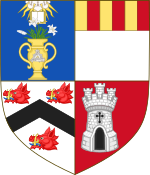
Back جامعة أبردين Arabic جامعة ابردين ARZ Aberdin Universiteti Azerbaijani آبردین بیلیمیوردو (ایسکاتلند) AZB Абердзінскі ўніверсітэт Byelorussian Universitat d'Aberdeen Catalan University of Aberdeen CEB Prifysgol Aberdeen Welsh University of Aberdeen Danish University of Aberdeen German
 Coat of arms of the University of Aberdeen | |
| Latin: Universitas Aberdonensis[1] | |
| Motto | Latin: Initium sapientiae timor domini |
|---|---|
Motto in English | The fear of the Lord is the beginning of wisdom |
| Type | Public research university Ancient university |
| Established | 1495 |
| Endowment | £58.6 million (2023)[2] |
| Budget | £268.6 million (2022/23)[2] |
| Chancellor | The Queen |
| Rector | Iona Fyfe |
| Principal | George Boyne |
Academic staff | 1,655 (2022/23)[3] |
Administrative staff | 1,920 (2022/23)[3] |
| Students | 15,455 (2022/23)[4] |
| Undergraduates | 9,715 (2022/23)[4] |
| Postgraduates | 5,740 (2022/23)[4] |
| Location | , Scotland, UK 57°09′55″N 02°06′08″W / 57.16528°N 2.10222°W |
| Campus | Urban, across two main sites |
| Colours | Burgundy and white (university colours) Gold and royal blue (sports colours) |
| Affiliations | |
| Mascot | Angus the Bull |
| Website | abdn |
The University of Aberdeen (abbreviated Aberd. in post-nominals; Scottish Gaelic: Oilthigh Obar Dheathain) is a public research university in Aberdeen, Scotland. It was founded in 1495 when William Elphinstone, Bishop of Aberdeen and Chancellor of Scotland, petitioned Pope Alexander VI on behalf of James IV, King of Scots to establish King's College,[5] making it one of Scotland's four ancient universities and the fifth-oldest university in the English-speaking world. Along with the universities of St Andrews, Glasgow, and Edinburgh, the university was part of the Scottish Enlightenment during the 18th century.
The university as it is currently constituted was formed in 1860 by a merger between King's College and Marischal College, a second university founded in 1593 as a Protestant alternative to the former. The university's iconic buildings act as symbols of wider Aberdeen, particularly Marischal College in the city centre and the crown steeple of King's College in Old Aberdeen. There are two campuses; the predominantly utilised King's College campus dominates the section of the city known as Old Aberdeen, which is approximately two miles north of the city centre. Although the original site of the university's foundation, most academic buildings apart from the King's College Chapel and Quadrangle were constructed in the 20th century during a period of significant expansion. The university's Foresterhill campus is next to Aberdeen Royal Infirmary and houses the School of Medicine and Dentistry as well as the School of Medical Sciences. Together these buildings form one of Europe's largest health campuses.[6] The annual income of the institution for 2022–23 was £268.6 million of which £56.3 million was from research grants and contracts, with an expenditure of £259.3 million.[2]
Aberdeen has educated a wide range of notable alumni, and the university played key roles in the Scottish Reformation, Scottish Enlightenment, and the Scottish Renaissance. Five Nobel laureates have since been associated with the university: two in Chemistry, one in Physiology or Medicine, one in Physics, and one in Peace.[7]
- ^ Anderson, Peter John (1907). Record of the Celebration of the Quatercentenary of the University of Aberdeen: From 25th to 28th September, 1906. Aberdeen, United Kingdom: Aberdeen University Press (University of Aberdeen). ASIN B001PK7B5G. ISBN 9781363625079.
- ^ a b c "Annual Reports & Accounts 2023" (PDF). University of Aberdeen. Retrieved 8 May 2024.
- ^ a b "Who's working in HE?". www.hesa.ac.uk. Higher Education Statistics Agency.
- ^ a b c "Where do HE students study?". Higher Education Statistics Agency. Retrieved 23 September 2024.
- ^ Bulloch, John Malcolm (1895). A History of the University of Aberdeen: 1495–1895. London: Hodder and Stoughton. pp. 18–19. Retrieved 20 December 2012.
- ^ "Medicine – University of Aberdeen". Times Higher Education (THE). Retrieved 12 July 2018.
- ^ "Fast Facts". University of Aberdeen. Archived from the original on 14 February 2015. Retrieved 27 June 2014.